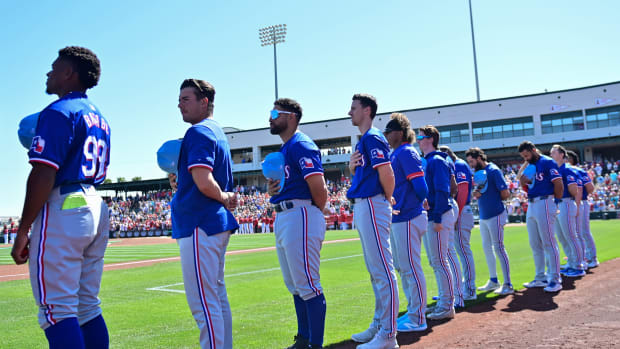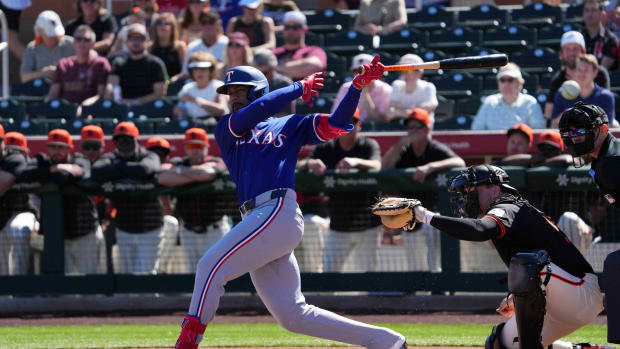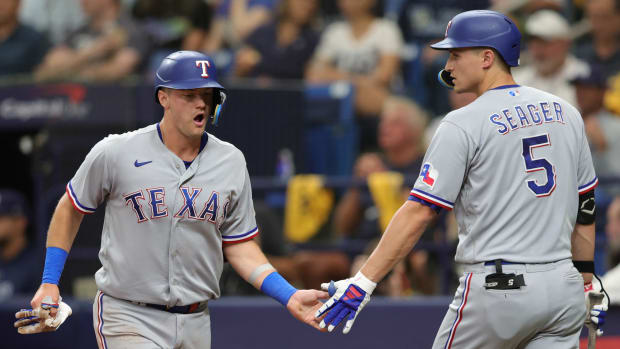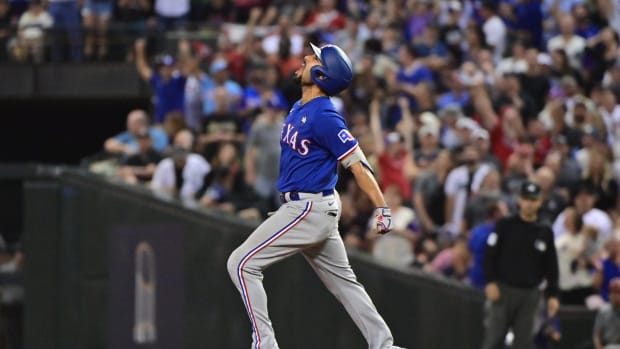The 2020 Texas Rangers: The Good and the Not So Good
DALLAS, Texas — Major League Baseball's 2020 regular season is complete. Amid the COVID-19 pandemic, many were skeptical whether the season would even lift off, much less actually play to completion.
But here we are. 60 games later, 16 teams will begin their quest for a World Series title on Tuesday while 14 teams will get a head start on their offseasons and potentially sit back and watch the the MLB postseason.
The Rangers are not only among the 14 teams who's season is over, they had the second-worst record in baseball with a mark of 22-38. So as I attempt to break down what went right and what went wrong, it's obvious a lot more went wrong this season.
Usually (to satisfy my OCD), I would list "The Good" ahead of the "Not So Good" in a format like this. But because there's way more of the latter, and I would rather tie this with a nice, positive bow on the end, we're going to look at the "Not So Good" first.
The Not So Good
Whew....here we go.
• Let's start with what was out of the Rangers' control: injuries. The big one was losing Corey Kluber after only an inning of work in his Rangers debut. It was a major blow to a rotation that general manager Jon Daniels shrewdly built to help the team contend for a playoff spot in 2020.
Injuries to José Leclerc, Danny Santana, Edinson Vólquez, and Joe Palumbo cost them nearly their entire season. Shin-Soo Choo, Willie Calhoun, Rougned Odor, and Jose Trevino all were able to play a certain chunk of the season, but were also limited by injury. Elvis Andrus was inevitably shut down near season's end, but he played through a back injury that hampered him nearly the entire length of the shortened season.
Injuries were expected given the circumstances, but the Rangers felt the brunt of them this year. No, it wasn't quite on the level of the 2014 season. And it certainly wasn't the only reason for the Rangers' poor record, but it played a factor.
• Now, for what the Rangers could control. On the surface, a 6-24 road record explains a lot of what went wrong in 2020. It was the worst road winning percentage in all of baseball this season. Strict road protocols may have played a role in the team's horrific performance away from Arlington, but manager Chris Woodward refuses to allow that to be an excuse.
• The Rangers' offense was abysmal. Texas finished with a 76 OPS+, which was not only second-worst only to Pittsburgh's 74, but beat the 1972 Texas Rangers for the worst in franchise history. In addition, their .217 batting average tied with '72 Rangers as the worst in franchise history. Their 224 runs scored was also second-worst to Pittsburgh's 219.
The following Rangers finished the season with a batting average below the Mendoza line:
- Elvis Andrus (.194 in 29 games)
- Sherten Apostel (.100 in seven games)
- Willie Calhoun (.190 in 29 games)
- Derek Dietrich (.197 in 25 games)
- Joey Gallo (.181 in 57 games)
- Jeff Mathis (.161 in 24 games)
- Rougned Odor (.167 in 38 games)
- Yadiel Rivera (.000 in four games)
- Danny Santana (.145 in 15 games)
- Eli White (.188 in 19 games)
Who knows how many of those players get above .200 in a 162-game season, but this is still an alarming list.
• We didn't get enough of the 2019 Joey Gallo this season. A .181/.308/.378 slash line speaks for itself, but a 19.3 at bats per home run (AB/HR) was easily the lowest of his six-year career.
To be fair, he had zero help around him; nobody to protect him in the lineup. His manager admitted that it wore on the 26-year-old slugger throughout the campaign. If the Rangers are committed to Gallo, it may be worthwhile to invest in a middle-of-the-order threat to hit behind him despite the inevitable cut in payroll.
• The pitching wasn't as bad as the offense, but it was also quite poor. Their 5.02 team ERA was 11th in the American League. The Rangers also failed at their goal of becoming a better strikeout team, posting an 8.5 strikeouts per nine innings (SO/9), which was good enough for 13th in the AL.
The Rangers didn't get the chance to see how the Corey Kluber trade would pan out, but their other two rotation additions did not live up to expectations. Kyle Gibson went 2-6 with a 5.35 ERA and a 1.53 WHIP while Jordan Lyles went 1-6 with a 7.02 ERA and a 1.56 WHIP. Gibson was a replacement-level pitcher with a 0.0 bWAR while Lyles' -1.1 bWAR was tied for second-worst in all of baseball.
The Good
• Lance Lynn pitched like a bonafide ace outside of two starts against the Houston Astros. Even so, Lynn finished 6-3 with a 3.32 ERA, a 1.06 WHIP, and a 2.3 bWAR. He also maintained his status as the epitome of a workhorse, logging more innings than any pitcher in baseball (84) and continued his streak of games with at least 100 pitches (37).
• In contrast to their road record, the Rangers finished the 2020 season 16-14 at home. Their 5-5 record against the Houston Astros also aided in handing their division rival a sub-.500 record in 2020.
• Jose Trevino unequivocally established himself as the No. 1 catcher. Not only did his defense and leadership skills go to another level, he did more than carry his own with the bat (.250/.280/.434 with two home runs and nine RBI). A wrist injury ended his season too early, but he's undoubtedly earned the trust of his manager to handle the pitching staff next season.
• Jonathan Hernández and Rafael Montero also established themselves in the back end of the bullpen. For a team that has several holes, it's always reassuring to have that part of the roster solidified.
• Chris Woodward wants his team to be aggressive on the basepaths. Looking at the numbers, they did that successfully, especially when you consider the Rangers' terrible .285 on-base percentage.
The Rangers stole 49 bases this season, which was tied for fourth in Major League Baseball. They were also well above league average with a 78 percent success rate. Their eight steals of third base was also fourth in baseball and they were one of only four teams to pull off a steal of home in 2020.
• Texas may also have two Gold Glove winners in 2020. According to the Fielding Bible, Joey Gallo was second in all of baseball with 13 Defensive Runs Saved (DRS). In addition, Isiah Kiner-Falefa was tied for third with Minnesota's Byron Buxton with 11 DRS.
• Of course, the highlight of the Rangers season is seeing some of the younger prospects get their first taste of big league action.
Leody Taveras may have done the most for his future, making himself a strong candidate to be the Opening Day centerfielder in 2021. As expected, his speed and defense transitioned damn near flawlessly to the Major League level. His slash line of .227/.308/.395 won't blow anyone away, but the 22-year-old showed tremendous growth at the plate. Remember, Taveras lacked limited experience above Single-A ball heading into 2020, with only 65 games at Double-A Frisco and zero games at the Triple-A level.
In a way, Anderson Tejeda forced his manager to eat his words, showing an ability to adjust quickly to the Major League game. He's still a bit raw and aggressive, but a .253 average and .726 OPS is more than respectable for his first taste of big league action.
Like Tejeda, top catching prospect Sam Huff showed an ability to quickly adjust to Major League pitching. Huff only logged 10 games in 2020. However, he went from looking a little like a nervous rookie in his debut to a much more confident player by game ten. He also was only one of two Rangers two have a multi-home run game this season along with Rougned Odor.
• As far as young pitching goes, Kyle Cody may have done the most to emerge as a rotation candidate in 2021. Assuming Lance Lynn will remain a Ranger this winter, there will be at least two rotation spots available. Cody's 1.59 ERA and 1.24 WHIP in 22 2/3 innings is a great start to his Major League career, especially when you consider his time off from Tommy John surgery and his lack of experience in the minor leagues (no innings in Double-A or Triple-A).
Final Thoughts
It was a tough season. There's no way around it. But if there is a silver lining, it's Jon Daniels' and the organization's commitment to the youth of the club next season. It gives the club a much needed identity. It may or may not be what fans want, but having an identity is better than none at all.
The Rangers may not compete next season, but 2021 will begin to reveal which of the young players will continue to establish themselves as key pieces moving forward and which ones will fall by the wayside.
Follow Inside The Rangers on SI on Twitter: @SITexasRangers
Like Inside The Rangers on SI on Facebook: www.facebook.com/SITexasRangers
Follow our Rangers insider Chris Halicke on Twitter: @ChrisHalicke




